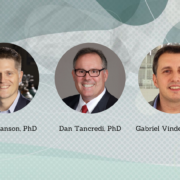ISAPP welcomes three new board members
By Mary Ellen Sanders, PhD, ISAPP Executive Science Officer
ISAPP is pleased to announce that Profs. Kelly Swanson PhD, Daniel Tancredi PhD, and Gabriel Vinderola PhD have joined the ISAPP board of directors. The expertise of these three globally recognized academic experts complements that of the current board members, together comprising a leading global group of distinguished scientific and clinical experts in the fields of probiotics, prebiotics, synbiotics, fermented foods, and postbiotics.
Read more about ISAPP’s newest board members:
Kelly Swanson is the Kraft Heinz Company Endowed Professor in Human Nutrition, a professor in the Department of Animal Sciences and Division of Nutritional Sciences and an adjunct professor in the Department of Veterinary Clinical Medicine at the University of Illinois at Urbana-Champaign. He is an expert in the field of fiber and prebiotics, and brings to ISAPP knowledge of application of these substances to companion and agricultural animals. Kelly, who trained with previous ISAPP Board member, George Fahey, is considered one of the top authorities in animal gut health, microbiome, and nutrition. His research has focused on testing the effects of nutritional intervention on health outcomes, identifying mechanisms by which nutrients impact gastrointestinal microbiota, host gene expression, and host physiology. Kelly served on the prebiotic consensus panel (here), led the ISAPP synbiotics consensus panel, and is lead author on the synbiotics outcome paper, currently in press with Nature Reviews Gastroenterology and Hepatology.
Dan Tancredi is a biostatistician with an appointment as an Associate Professor (full professor starting July 1, 2020) in Residence at UC Davis Department of Pediatrics, and is also with the Center for Healthcare Policy and Research. Dan works extensively on NIH-sponsored research and as an NIH scientific reviewer. He has an extensive record of collaboration with ISAPP; he has served as an invited expert and/or speaker at all but one ISAPP meeting since 2009, providing his perspectives on how to improve the quality and scientific impact of probiotic trials and how to conduct systematic reviews that rigorously and transparently synthesize the evidence from these trials. He has been a co-author on 6 ISAPP papers (here, here, here, here, here, here and here), including a 2020 paper “Probiotics as a Tx Resource in Primary Care” published in the Journal of Family Practice (see New publication gives a rundown on probiotics for primary care physicians). Dan was invited to author the Nature commentary on the landmark probiotics trial by Panigrahi, et al. for reducing newborn sepsis in the developing world—showing his reputation as a trusted voice for assessing the quality of probiotic research.
Gabriel Vinderola is a professor at National University of Litoral, Santa Fe, Argentina and Principal Researcher at CONICET, at the Dairy Products Institute (UNLCONICET). He is an expert in lactic acid bacteria, fermented foods, and probiotics. Gabriel has forged academic collaborations with academic and industrial scientists in numerous countries in Europe and with industrial colleagues in Argentina. He has been active in several countries in South America working with regulators to assure that their actions on probiotic guidelines are science-based, including his recent efforts consulting on guidelines for probiotics for the Codex Alimentarius. He has written blogs for ISAPP, translated ISAPP videos and infographics into Spanish, and was an expert on the ISAPP consensus panel on postbiotics. His research has focused on technological aspects of probiotics (biomass production, dehydration, storage, food matrices) and fermented foods. He is an active public science communicator in Argentina on the topics of probiotics, prebiotics, fermented foods, and the microbiome. See Growing interest in beneficial microbes and fermented foods in Argentina for some examples. Gabriel represents the first ISAPP board member from South America and we anticipate his involvement will help ISAPP expand its presence and connections in Latin America.





